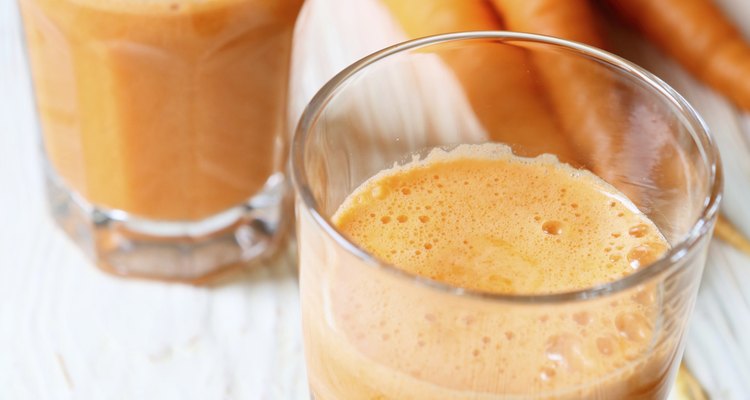
Olha_Afanasieva/iStock/Getty Images
Raw vegetable juice is a good source of enzymes, but the enzymes in the vegetables don't help digest the juice or rest the digestive system as some juice proponents suggest. Your body makes its own enzymes that help you digest food, including the nutrients in the juice. While juicing vegetables is a good way to up your veggie intake, it's a good idea to include the whole versions in your diet for better health.
Raw Vegetables and Enzymes
People juice for a number of different reasons, including detoxification, weight loss, better health and as a way to give the digestive system a rest. When it comes to digestion, the thought is that enzymes in fresh vegetable juice not only give the digestive system a rest, but also improve the digestive process and increase nutrient absorption. However, while drinking raw juice has its benefits, it may not improve the body's ability to absorb nutrients. In fact, the enzymes in the raw vegetable juice may lose activity once they hit the acidic stomach.
Additionally, raw foods are not always the best source of all nutrients. A 2008 study published in the British Journal of Nutrition found that people who follow a raw food diet have low blood levels of lycopene, a carotenoid that may protect from certain types of cancer. Cooking vegetables helps release the nutrient from the plant cells, increasing the amount available for absorption.
Vegetable Juice Digestion
When you juice vegetables you're getting the carbohydrates and protein without the fiber. These macronutrients must undergo some amount of digestion before they're absorbed.
After you swallow vegetable juice it enters the stomach where the proteins in the juice are denatured by the acid and enzymes in the stomach. Then, the mixture is sent to the small intestines, where more enzymes work on breaking down the sugar and the proteins into smaller molecules and amino acids, which are then absorbed, along with the water from the juice.
The vitamins and minerals are also absorbed in the intestines in various ways depending on the nutrient.
Concerns About Vegetable Juicing
While vegetable juicing can be a healthy addition to your diet, it should not be your only source of nutrition for any great length of time. Vegetable juicing may limit your overall caloric intake so much that your body goes into what's referred to as starvation mode. This means that your metabolic rate slows down to conserve energy. Some people also complain of fatigue and dizziness when following vegetable fasts.
Benefits of Vegetable Juice
If you're like most Americans, you may be having a hard time meeting your daily vegetable needs, and juicing them may help increase your intake. To get more benefits from vegetable juice, add some of the leftover pulp for fiber. Also limit your vegetable juice serving size to 8 ounces a day, and always drink your fresh vegetable juice immediately to limit the risk of foodborne illness.
Related Articles

Carrot Juice Diet
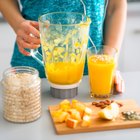
How to Juice for Colon Health
How to Tell If Fresh Tomato Juice Is ...
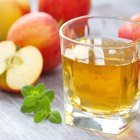
Apple Juice Cleansing Diet

How to Keep Cucumber Juice Fresh

How to Use Wheatgrass for Washing Hair

Where to Buy Pomegranate Juice

How Long Does It Take to Steam a Yam?
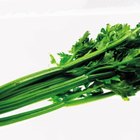
Can You Juice Celery Leaves?

The Difference Between Fruit Juice & ...

What Juices Are Good for Healing Acne ...

Juicing for Wrinkles

Juicing to Tighten Flabby Skin
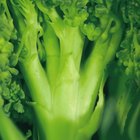
If I Puree Raw Vegetables Will That ...

How Long Can You Preserve Fresh ...
Can You Juice Butternut Squash?

How Long Does Tomato Juice Last After ...

Is Wheat Grass an Alkalizing Food?

All-Natural Tomato Juice Versus From ...

Does Boiling Carrots Destroy the ...
References
- U.S. Department of Agriculture and U.S. Department of Health and Human Services: Dietary Guidelines for Americans, 2010
- PBS: Juicing Need to Know
- International Foundation for Functional Gastrointestinal Disorders: Your Digestive System and How It Works
- QuickandDirtyTricks.com: Nutrition Diva: Juicing: Healthy Habit or Sugar Bomb?
- University of Pittsburgh Medical Center: Fad Diets
- Austin Community College: Enzymes
- Scientific American: Fact or Fiction: Raw Veggies are Healthier Than Cooked Once
- British Journal of Nutrition: Long-Term Strict Raw Food Diet Is Associated With Favourable Plasma Beta-Carotene and Low Plasma Lycopene Concentrations in Germans
- Journal of Agricultural and Food Chemistry: Thermal Processing Enhances the Nutritional Value of Tomatoes by Increasing Total Antioxidant Activity
Writer Bio
Jill Corleone is a registered dietitian and health coach who has been writing and sharing her love of food, nutrition and health with anyone who'll listen for almost 20 years. Her work has been featured on the Huffington Post, Diabetes Self-Management and Working Mother.
Photo Credits
Olha_Afanasieva/iStock/Getty Images